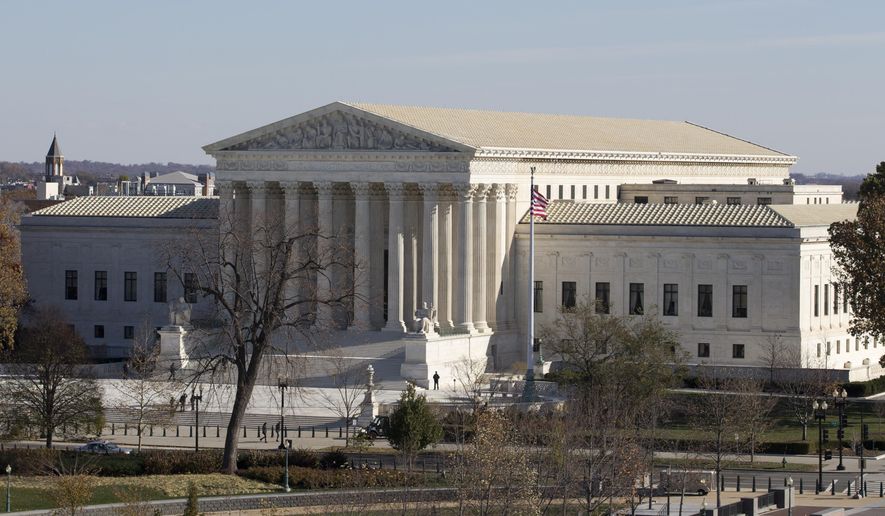OPINION:
For his next directive, will President Obama merge Cuba’s socialist health care system with Obamacare?
Why not? He has a penchant for shocking us almost daily. But since this is the season of hope, how about a little good news about Obamacare?
There is a real possibility that the Supreme Court might actually make up for its earlier error and find key elements of it unconstitutional next June.
Of the many challenges to the misnamed Affordable Care Act, two stand out as potent threats to the law’s continued legality.
The first is King v. Burwell, which the Court has agreed to hear in its upcoming spring session. The case is a challenge to the creation of Obamacare subsidies in the federal exchanges created in the 36 states that declined to create their own exchanges.
The law does not provide for such subsidies, says Virginia resident David King, 63, who contends that he should be immune from Obamacare’s penalty tax on his decision not to buy insurance.
AUDIO: Robert Knight with Andy Parks
When the IRS expanded subsidies to states like Virginia that had only a federal exchange, it put Mr. King in the position of being vulnerable to the fine again. The IRS and the District Court basically said that this is what Congress would have wanted, even though the law doesn’t specify it.
“[L]egislative purpose must be effected by the words Congress uses, not the words it might have meant or should have chosen to use,” a brief filed by the American Civil Rights Union states. “Courts are not empowered under Article III to divine Congress’s overarching objective and then reverse-engineer a version of the law that best achieves it.”
One might argue that this is exactly what the Supreme Court did in June 2012 when Chief Justice John Roberts somehow found a way to uphold Obamacare as a “tax.”
It might be more difficult this time around to construct a similar conclusion, given Congress’s clear meaning in the pertinent section of the ACA.
As for the second serious case, remember the “death panel,” for which Sarah Palin continues to be assailed by her detractors?
It’s real.
The Independent Payment Advisory Board (IPAB), consisting of 15 unelected bureaucrats appointed by the president, is empowered to set Medicare payment limits. But the ACA’s wording is so loose that the board could effectively control all costs associated with healthcare, according to a Cato Institute study by Diane Cohen and Michael F. Cannon, “Payment Advisory Board, PPACA’s Anti-Constitutional and Authoritarian Super-Legislature,” released in June 2012.
What’s more, it could do so with impunity, the authors say, because there is no oversight provision: “When the unelected government officials on this board submit a legislative proposal to Congress, it automatically becomes law: PPACA requires the Secretary of Health and Human Services to implement it.”
Citing these dangers, Arizona orthopedic surgeon Eric N. Novack and Arizona businessman Nick Coons filed a lawsuit that made its way to the Ninth Circuit Court of Appeals, in Coons and Novack, et al v. Lew and Burwell, et al. When the Ninth declined to overturn a district court’s dismissal of the case, the two plaintiffs appealed to the Supreme Court, which has yet to rule on whether it will hear the case.
It should.
It’s not likely that America’s founders, who constructed an explicit system of separate, enumerated authority, intended that any government entity ever acquire the kind of raw power that Obamacare gives to the IPAB.
“IPAB truly is independent, but in the worst sense of the word. It wields power independent of Congress, independent of the president, independent of the judiciary, and independent of the will of the people,” Cohen and Cannon write.
In fact, the law is written to assure that a future Congress could never alter the board’s powers, an unprecedented limitation on Congress’s legislative power.
“PPACA forbids Congress from repealing IPAB outside of a seven-month window in the year 2017, and even then requires a three-fifths majority in both chambers,” Cohen and Cannon write. “A heretofore unreported feature of PPACA dictates that if Congress misses that repeal window, PPACA prohibits Congress from ever altering an IPAB ’proposal.’ By restricting lawmaking powers of future Congresses, PPACA thus attempts to amend the Constitution by statute.”
In a brief that urges the Supreme Court to hear the case, the American Civil Rights Union states that, “Under the ACA, the IPAB’s ’proposals’ are not proposals at all…. IPAB involves the most extreme Delegation of Powers violation, and the most comprehensive assault on the fundamental Constitutional Separation of Powers Doctrine, in the history of American law.”
What may sound to some like hyperbole is actually a hard, realistic assessment. IPAB is really that dangerous.
As the hammer blows of Obamacare keep falling and Congress dithers, more and more people will be praying that the Court finally does the right thing in at least one of these cases.
Robert Knight is Senior Fellow for the American Civil Rights Union and
a columnist for The Washington Times.




Please read our comment policy before commenting.